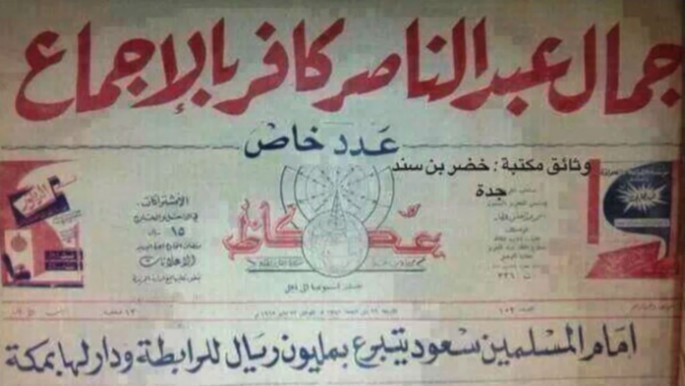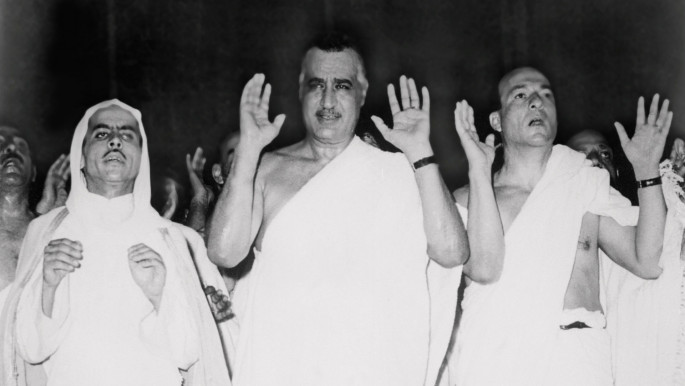
'A bunch of kuffar b*st*rds': Saudi Arabia's religious Takfiri war against political enemies
The Supreme Council of Islamic Scholars, Saudi Arabia's most senior religious body, announced earlier this summer that the followers of the Muslim Brotherhood did not adhere to the Sunnah - the sayings and teachings of the Prophet Mohammed - and openly accused the Islamist group of using religion for political gain.
But Saudi Arabia and the Muslim Brotherhood were not always at odds. When Nasser was enemy number one for the Saudi regime in the 1960s, clerics like Grand Mufti bin Baz hounded the Egyptian president over his decision to imprison and later execute Sayyid Qutb - one of the godfathers of the Muslim Brotherhood.
Bin Baz even went as far as to condemn Nasser to an eternity in hell for Qutb's execution, in a letter headlined with a Quranic verse.
The enemy of my enemy
Saudi Arabia is the home of Wahhabism, a highly puritanical interpretation of Islam that has helped form the kingdom's laws since the country's creation in 1932. Wahhabism is notable for its embrace of takfir - the act of calling a fellow Muslim with slightly different views "a non-believer".
Twitter Post
|
By way of example, Sheikh Abdul Aziz bin Baz, the Grand Mufti of Saudi Arabia (1993-1999), famously claimed in 1976 that the world was flat, adding that anyone who disputed his claim was "an atheist who deserves to be punished".
The majority of Islamic scholars today reject the principle of takfir, as the Prophet (PBUH) reportedly said it could only be permissible when a Muslim has already called themselves a non-Muslim.
|
|
||
| Cleric tells story of letter sent to Nasser by Bin Baz about the Qutb execution |
And according to various Hadiths - some even supported by bin Baz himself - one cannot call a Muslim a "Kafir" just because they've sinned.
"It is not permissible to takfir your brother or call him an enemy of God," said bin Baz.
Yet the House of Saud has repeatedly called takfir on its enemies, both political and otherwise.
In 1965, the state-owned Saudi newspaper Okaz published a special edition, headlined in bold red ink: "[Egyptian President] Gamal Abdel Nasser is a Kafir."
 |
|
| Saudi newspaper Okaz declares Egyptian President Nasser a kaffir, 1965 |
The headline was followed by features quoting "numerous scholars" who reportedly agreed that Nasser, Saudi Arabia's then arch-nemesis, was no longer a Muslim and that holy war against him was the duty of all true Muslims.
In this way, Nasser and the Muslim Brotherhood of today have something in common: They have both at some point presented a challenge to Saudi aspirations of power in the region.
Nasser promised to end the rule of monarchs through his secular pan-Arabist dream, while the Muslim Brotherhood challenged the supremacy of Saudi Arabia's Wahhabism with their grassroots Sunni movement, preaching reform.
The liberal push - the conservative shove
Nasser's rise to power created a schism in a once homogenous Middle East. The political struggle between the new socialist, republican, pan-Arabist wave represented by Nasser met great opposition and scorn from the Saudis who fashioned themselves as the keepers of the old order and tradition grounded in Islam.
Nasser had a vision to transform the Middle East away from tradition and into the modern age. He fashioned his secular image against the religious one preached by the Muslim Brotherhood in Egypt and by extension the Saudi-Wahhabi state across the Red Sea. He mocked the Saudi regime often referring to them as "the bearded lot".
The bearded lot continued to dance to the same tunes for which Nasser mocked them. Then as the power struggle created by Nasser waned so did their apparent commitment to the hard-line of their ideology. For the first five years of the 1970s Saudi Arabia saw a shift towards liberalisation and what many viewed as secularisation. Women were admitted to schools for the first time - a move that cost King Faisal his life.
The shock brought about by Faisal's assassination forced liberalisation into remission. But the silencing of internal liberal voices did not mean they were muted all together. By the 1990s, Saudi Arabia occupied a large share of the Middle East's media market. Owning channels like ART, MBC and Rotana but basing them in nearby Arab nations like the UAE and Egypt, the Wahhabi kingdom broadcast variety entertainment that its own clerics preached against and condemned as un-Islamic.
In the post-9/11 world, the issue of internal liberalisation crept up under international pressure. Wahhabi involvement with Bin Laden meant that Saudi-style conservatism was in the hot seat. Leaning on their liberal media arm, the royal family began a slow shift away from their clerics.
MBS: Creeping liberalism
Today, there is a new power struggle in Riyadh's palatial halls that has confounded observers.
In April 2016, the Saudi religious police - the traditional upholders of the country's puritanical culture - were stripped of the power to arrest, limiting them merely to the role of reporting violations to the state police.
And last week, King Salman reversed a long-standing ban against women driving - the latest development in a long list of "liberalisation" policies.
The majority of these ideas can be linked to the country's far-reaching economic reform program, 'Vision 2030', and its architect - the new crown prince, Mohammad bin Salman. MbS was reportedly responsible for the country's disastrous war in Yemen - and its blockade against Qatar.
![Mohammad bin Salman Al Saud delivers a speech during a press conference in Riyadh 2016 [Getty] Mohammad bin Salman Al Saud delivers a speech during a press conference in Riyadh 2016 [Getty]](https://www.newarab.com/sites/default/files/styles/medium_16_9/public/media/images/F6A7248C-9BEF-4AB1-B899-61B16431F2FC.jpg?h=d1cb525d&itok=3m2JRZkb) |
|
|
Mohammad bin Salman delivers a speech |
Among the blockading nations' thirteen demands to Qatar was an order to "sever all ties to terrorist organisations - specifically the Muslim Brotherhood".
This "terrorist" designation was discussed at length in the White House, after United States President Donald Trump accused the organisation of terrorism - principally for its support of the Palestinian resistance group, Hamas.
This designation was later postponed after a State Department memo explained there's "not one monolithic Muslim Brotherhood," and its members came from a wide range of backgrounds. It is not designated a "terrorist organisation" by the US, UK, European Union or the United Nations.
The relationship between the ruling Al-Saud family and the Islamist organisation has always been contentious. The kingdom views Islamist groups as a major internal threat to its rule. In a country where the orthodox philosophy, Wahhabism, demands total obedience to the ruler - any and all outside religious or political groups are perceived as a threat.
The New York Times reported in 2014 that Saudi Arabia and its allies feared the Muslim Brotherhood for its "broad organization, its mainstream appeal and its calls for elections".
Separation of church and state - with a Saudi twist
The origins of this fear go back to the beginnings of the Saudi state itself - and its alliance with the Wahhabi brand of ultra-conservative Islam.
The Al-Saud clan realised early on that the Wahhabi reading of Islamic texts benefited them greatly, as such an interpretation allowed rulers to crush rebellions. The reasoning being that dissent causes division and therefore discord between Muslims.
 |
The New York Times reported in 2014 that Saudi Arabia and its allies feared the Muslim Brotherhood for its "broad organization, its mainstream appeal and its calls for elections". |  |
The Wahhabi doctrine allowed dissent only if the Muslim leadership was declared Kafir or corrupt - an interpretation that continues to serve al-Saud to this day - both domestically and regionally.
The deal between Abdel Aziz al-Saud and the Wahhabi clerics centred on a balance of power. Under this equation, the Wahhabis got to set the theological tone of the new kingdom while the House of Saud benefited from the doctrine's veneration of the ruling class.
In short, the Wahhabi interpretation allowed the Saudi clan to persecute its enemies through the religion of peace, while the religious leaders were allowed to keep hold of their power. The clerics demanded conformity and an absolute allegiance to the monarch - using religion as its tool.
And, despite the Hadith quoting the Prophet Mohammed against the usage of Takfir, the practice continues to this day - not only in the kingdom, but in extremist armed organisations.
 |
|
| August 1965, Nasser praying during the pilgrimage to Mecca [Getty] |
Other groups that have adopted a Takfiri philosophy include al-Qaeda, the Islamic State group, Boko Haram, al-Shabab - some of the most violent groups in the world - all with suspected links to Riyadh.
The Henry Jackson Society, a right-wing UK think tank, recently published a report which claimed the kingdom had spent $4 billion in exporting its interpretation of Islam - in 2016 alone.
The report was also notable for its accusation that Riyadh was the "foremost" foreign funder of Islamist extremism in the UK.
It may seem ironic to the average reader that Saudi Arabia should therefore label its enemies as terrorists, but this is the reality in which Qatar and the Muslim Brotherhood have found themselves.
By offering an alternative to the theocratic state, they became threats to the kingdom's survival and were susceptible to the usual treatment - trial by religion, no matter how perverted from its original message that religion may have become.
The liberal quest for power
Who was more shocked by Saudi Arabia reversing its driving ban against women - the international community or the country's own conservative clerics?
The order came from the top of the ruling elite, completely overturning decades of fatwas and retrospective explanations from religious spokesmen.
The former Grand Mufti Abdel Aziz bin Baz had argued that lifting the ban would corrupt society with promiscuity and sin. Last month, a cleric was banned from preaching for saying women shouldn't be allowed to drive as they possessed "only a quarter" of men's brainpower.
But what the legal change did do - in one single tweet - was point out the hypocrisy at the heart of these messages.
The very next day, some of the same clerics who had been defending the ban were suddenly against it. Like a schoolyard bully's sidekick, they immediately started to parrot and repeat what their gang-leader was spouting - no matter their previous position.
The decision to overturn the driving ban - believed to have come straight from MbS and his "liberal" associates - is part of a bigger picture of similar kickbacks being delivered for international public relations.
MbS has surrounded himself with a group of 30-somethings with a different worldview to their parents. For MbS, nothing now is more important than ensuring his own survival and the promotion of Saudi Arabia as the single arbiter of Middle Eastern power. To achieve this, he requires American approval. To attain approval, he knows that his country has to evolve - and fast.
Historically, the country's clerics were always a tool to keep the authoritarian royal family in power. Now, the self-same clerics have become an obstacle to closer ties with Washington and are finding themselves on the way out.
For more than forty years, a small group of Conservative men have held control over the country's ultra-orthodox religion and culture. They are now reportedly veing isolated, undermined and removed from positions of authority. For millions of the country's citizens, the question of what will replace them needs to be answered.
Rob Cusack and Gehad Quisay are staff writers for The New Arab. Follow us on Twitter: @The_NewArab
Opinions expressed in this article remain those of the author and do not necessarily represent those of The New Arab, al-Araby al-Jadeed, its editorial board or staff.







 Follow the Middle East's top stories in English at The New Arab on Google News
Follow the Middle East's top stories in English at The New Arab on Google News


